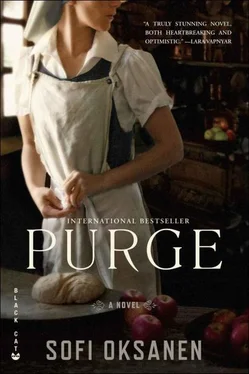“Ah!”
“From Tallinn.”
“And now you want to go there? So he’ll be sure to find you?”
“No!”
“Why, then?”
“I have to get away from here.”
“I’m sure you can get to Russia. Through Valga. Or Narva.”
“I can’t go there! I have to get to Tallinn and over the border. My husband has my passport.”
Aliide bent over her bottle of heart medicine. The smell of garlic wafted to meet her. She took a spoonful of the stiff tonic honey and carried the bottle back to the refrigerator. She should make some more of it, maybe a little stronger, put more garlic in it-she felt so weak. The scissors felt heavy in her hand as she snipped some onion tops into the potatoes. Her teeth felt too weak even for bread. The girl had a ponderous gaze. Aliide picked up a sour pickle, cut off the end, sliced it up, and started popping the slices into her mouth. The juice lubricated her throat and her voice, made it supple, in control.
“Your husband must be a special kind of man.” “Yes, he is.”
“’Cause I’ve never heard of an Estonian man who would go to Vladivostok to get a wife and then teach her Estonian.
The world has certainly changed!”
“Pasha is Russian Estonian.”
“Pasha? Well, even so. I never heard of a Russian Estonian man who would go to Vladivostok to get a wife and then teach her Estonian. Is that what happened? Because normally what happens is that Russian Estonians speak Russian, and their wives start spitting out Russian just like they do. Sunflower seeds just flying out with every word.” “Pasha is a special kind of man.”
“Well, of course! And aren’t you a lucky girl! Why did he go to Vladivostok to find a wife?”
“He had a job there.”
“A job?”
“Yes, a job!”
“’Cause normally they come here from Russia to work, not the other way around. So it was a question of work, was it?”
“Pasha is a special kind of man.”
“A real prince, from the sound of it! And he even took you to Canada on vacation.”
“Actually, we got to know each other better in Canada. I had gone there to work as a waitress, like I said before, and then I ran into a man that I knew-Pasha.”
“And then you got married, and he said that you didn’t have to work as a waitress anymore.”
“Something like that.”
“You could write a novel about your wonderful story.”
“Could I?”
“Pampering, vacations, cars. A lot of girls would stick around if they had a man like that.”
Vladivostok, Russian federation
In the Wardrobe Is Grandmother’s Suitcase, and in the Suitcase Is Grandmother’s Quilted Coat
Zara hid the things Oksanka had given her in the suitcase she had stored in the wardrobe, because she didn’t know what her mother would think of the whole thing. She wasn’t worried about her grandmother; she knew she wouldn’t tell her mother about what Oksanka had said. But Zara would have to mention Oksanka’s visit, because the women in the apartment commune would gossip about it in any case. They would want to know what gifts she had brought, and she’d have to give each of them a swallow of gin. Her mother would probably be happy about the gifts, too, but would she be happy about Zara getting a job in Germany? Would it help if Zara could tell her how many dollars she would be able to send home? If it were a whole lot of dollars? She would have to ask Oksanka tomorrow about how large a sum she should venture to promise. Maybe she should clear up some other things, too. Would she be able to save enough to live on for five years, so that she could go to college and graduate? Would she be able to save some money to send home, too? Or what if she just worked there for a little while, maybe half a year-would she manage to save enough in that amount of time?
Zara put the stockings from Oksanka in the suitcase. If her mother saw them, she would sell them immediately, say that Zara didn’t need them.
Grandmother stopped looking at the sky for a moment. “What’s in there?”
Zara showed her the package. It was like a transparent plastic envelope with a shining, multicolored printed picture inside of a white-toothed woman and a long pair of legs. There was a little window in the package that you could see the stockings through. Grandmother turned the package over in her hands. Zara was opening it to show her the stockings, but Grandmother stopped her. No point in that. She would only spoil them with her rough hands. Was it even possible to darn such fine stockings?
“Just stash them away,” Grandmother said, adding that silk stockings had been hard currency when she was young.
Zara went back to the wardrobe and decided to put the stockings and the other things at the very bottom of the suitcase. She dragged the case out onto the floor and started to unpack it. They always had suitcases packed and ready in the wardrobe. One for her mother, one for her grandmother, one for Zara. They said it was in case of fire. Grandmother packed and checked them at night sometimes, clattering around so much that Zara woke up. When Zara was growing up, Grandmother had always replaced the clothes in the suitcase when she outgrew them. That’s where all their important papers were, too, and the jacket with the money hidden in the collar, and the medicines that they replaced at regular intervals. Plus needles, thread, buttons, and safety pins. In Grandmother’s suitcase, there was also a shabby gray quilted coat. Its padding was almost petrified, and the stitches that ran up and down it were as uniform as barbed wire, a peculiar contrast to the ungainliness of the coat.
As a child, Zara had always imagined that Grandmother couldn’t see anything but the sky glimmering outside the window-that she didn’t notice anything that was happening in the house-but once, when her suitcase accidentally fell off the shelf in the wardrobe and crashed onto the floor and the locks broke, she turned quickly, like a young girl, and her mouth had twisted open like the lid of a jar. The quilted coat, which Zara had never seen before, had ballooned to the floor. Grandmother had remained seated in her regular spot by the window, but her eyes had latched on to Zara, into Zara, and Zara didn’t understand why she felt embarrassed and why it was a different kind of embarrassment than when she stumbled or answered wrong at school.
“Put that away.”
When her mother came home, she had glued and tied the suitcase shut. She hadn’t been able to fix the locks. Zara was given the locks to play with and made earrings out of them for her doll. It was one of the most significant events of Zara’s childhood, although even later on she didn’t understand what had happened and why, but after that she and her grandmother developed more of their own stories. Grandmother started to have Zara help her when she did the canning at harvest time. Her mother was at work and never had any time to water or weed their vegetable patch. Zara and Grandmother took care of it together, just the two of them, and Grandmother would tell her stories of that other country, in that other language. Zara had heard it for the first time when she woke up in the middle of the night and heard Grandmother talking to herself by the window. She woke her mother up and whispered that there was something wrong with Grandmother. Her mother threw off her blanket, shoved her feet into her slippers, and pushed Zara’s head back onto the pillow without saying anything. Zara obeyed. The sound of her mother talking was strange, and Grandmother answered with strange words. The suitcases were lying on the floor with their mouths open. Mother touched Grandmother’s hands and brow and gave her some water and Validol, and she took them without looking at her, which wasn’t unusual; Grandmother never looked at anyone, she always looked past them. Mother gathered up the suitcases, closed them in the wardrobe, and put her hand on Grandmother’s forehead. Then they sat there, staring out at the darkness.
Читать дальше












